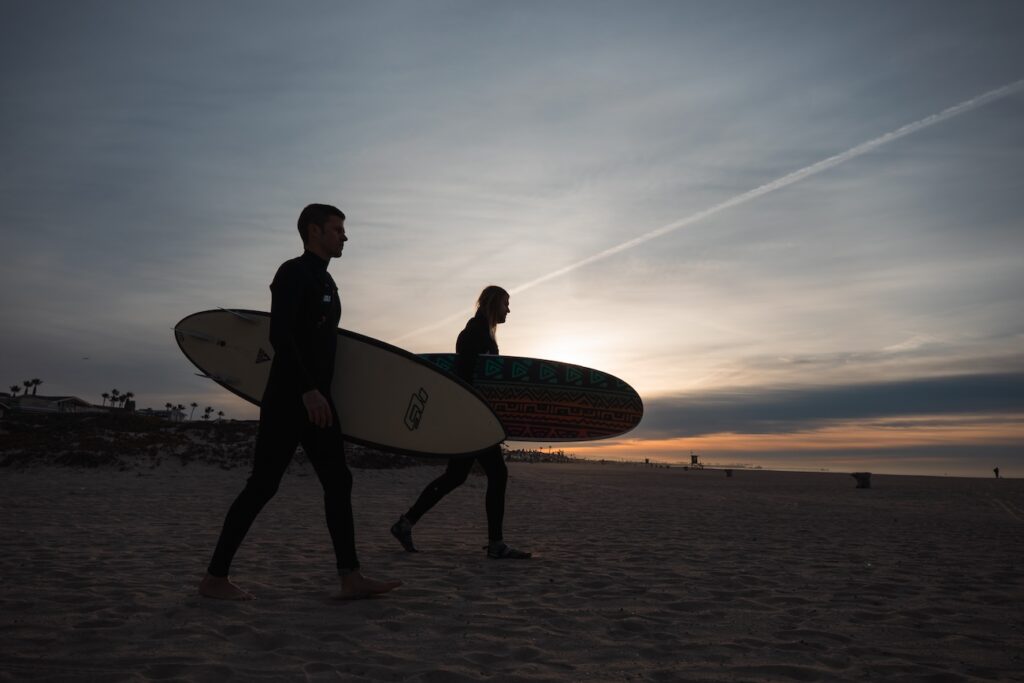When a surfer gets trapped between an incoming wave and the shore, it’s said he’s been “caught inside.” Surfers dread being caught inside. You can’t escape—you can only try not to panic—as the wave comes toward you. It’s inevitable. You’re going to be pushed down by a force far bigger than you are.
In a sense, surfer Jason Murchison has been caught inside for ten years. That can happen when you’re trying to earn a living in California.
Surfing Lessons
“It’s bizarre,” Jason says. In California, “they’d rather turn you into a homeless veteran than have you be a veteran-owned business.”
The son of a police officer, Jason joined the Navy after college and trained as a diver specializing in “explosive ordinance disposal.” (That means he knows how to disarm bombs underwater.) After the Navy he decided to go to law school, taking evening classes so he could work during the day in Huntington Beach and neighboring Newport Beach.
Jason has been surfing since he was five or six years old. His family was athletic. “I grew up playing organized sports: football, basketball, baseball,” Jason says. But surfing was what he loved—maybe because, unlike other sports, he didn’t do it competitively. There was no score, no team to beat. “It was more like, you go out at your own leisure,” he says. There’s freedom and independence on the water: You’re self-reliant, with infinite possibilities open to you.

With the Navy behind him, and several years of nighttime law classes ahead of him, Jason started teaching surfing classes during the day to support himself. It made sense: If you have a chance to earn a living doing what you love—the thing that makes you feel free—you take it. And after his Navy training, being in the water to teach surfing felt “like vacation,” Jason says.
The funny thing is, he was good at teaching surfing. He was so good he had to hire additional instructors to help meet the demand for classes. He was teaching kids as young as four, plus adults, including veterans from Wounded Warriors. Most were beginners trying something new.
“You’ll get kids from all over the country,” Jason says. Some “have literally never seen an ocean, and they’re terrified.” He’ll start them in a beginner area, away from the waves that can rise to ten feet. “And seeing them go from terrified to excited—it’s fun,” he says.
Soon, this job that was meant to be temporary—just a way to make money until he earned his law degree—was spinning into a successful, full-time business. (He called it Learn to Surf.) By the time Jason graduated law school, he no longer needed to be a lawyer. He had a livelihood he was proud of, a company he’d built from the ground up, and a roster of contractors working for him.
“If I could give Jason 985 stars, I absolutely would!” one mom writes in a TripAdvisor review. She explains that she’s a local from Newport Beach (next to Huntington Beach) who found Jason while searching for a surf instructor “who could handle not only children, but two children with extensive disabilities. WOW!!! He has not only taken the challenge with extraordinary grace and patience, but has taught them both how to surf… A challenge I thought would be impossible.”
There was only one problem: The City of Newport Beach said Jason’s surfing lessons broke the law.
A ‘Jesse-James-style criminal’
In 2012, Newport Beach banned almost all paid lessons in public parks and beaches. You can only teach a lesson for pay on the beach if you have written permission from the director of the Recreation and Senior Services Department.
Since then, at least 13 surfing instructors—including Jason—have tried to get permission to teach surfing in Newport Beach. Only three were approved. According to public records, they each give 20-30% of their lesson fees to the City.
Jason tried to get approval twice, in 2015 and 2016. The City told him Newport Beach didn’t need any more surfing instructors.
It’s an odd but familiar refrain: Whenever the government sets itself up as a bouncer at the door of economic activity—allowing some (favored) businesses in, turning others away—it uses this amorphous concept of need as an excuse. In some states, businesses in certain industries (mainly healthcare and transportation) are forced to get a “certificate of need” from regulators before they can operate—as if bureaucrats in government offices were the final arbiters over what any community, or any one customer, needs.
“It seems almost like this mythical bunch of people making these decisions behind closed doors,” Jason says.
He continued with surfing lessons, advertising to people in Huntington Beach, Laguna Beach, and Newport Beach. There was, despite what Newport Beach claimed, a need for lessons there: Two of the three City-approved instructors didn’t offer winter lessons. (Jason’s business is year-round.) Jason taught his Newport Beach customers “in this very gray area zone known as the Santa Ana River Jetty,” he says, which is owned and operated by Orange County. On a map, the jetty is closer to Huntington State Beach than to the Newport Beach Pier.
Newport Beach went after Jason. First he got an “administrative citation” for $100. “PLEASE IMMEDIATELY CEASE OFFERING ALL SURF LESSONS WITHIN THE CITY OF NEWPORT BEACH,” the citation ordered.
Then, in November 2016, the City filed a civil lawsuit against him for operating an “illegal business.” The complaint cites Jason’s website as evidence against him. (“Photographs on the Website depict Defendant engaging in certain acts that the Website characterizes as providing surf lessons.”)
“They’ve turned me into this Jesse James-style criminal,” Jason says. “I’m just trying to operate a business.”
If Jason were teaching lessons for free, the City would have no problem with him: Free surfing lessons are allowed in Newport Beach. Jason could gather an entire college fraternity on the beach for a group lesson and it would be protected as free speech. But because he’s earning a living from his lessons, the City wants him to stop.
Eventually Jason and Newport Beach reached a settlement. Now the City is trying to collect $19,000 from him in fines and fees.

The Lawsuit
This near-decade-long dispute with Newport Beach has cast a pall over Jason’s surfing. When the government sues you, it can feel like you’re being hunted. Jason has seen code enforcement agents in a boat watching him give lessons. He and his fiancée have had “a lot of sleepless nights, a lot of tears, a lot of fear,” he says. (His law degree, at least, helped him make sense of the documents he’s received from the City.)
He found Pacific Legal Foundation through a local who was familiar with PLF’s reputation. When Jason found out PLF would take his case, he and his fiancée both cried. “I was so happy and she was relieved,” he says.
In late January, PLF filed Jason’s lawsuit against Newport Beach.
“This is a constitutional issue,” Jason says. “And I know it’’s kind of goofy because it’’s in the surf world, but this is America. And if we don’’t fight for our rights, they’’re taken away slowly over time. Just one more thing that’’s taken away.”
By suing the City, Jason is leaning into his legal fight with the City instead of hiding from it. “If I don’t fight, then I fail my children, I fail my fiancée, I fail myself,” he says. (He and his fiancée have a baby and a toddler.) “I’ve just never been able to stop and quit, especially when I know I’m in the right.”
He thinks about his legacy to his kids. “Is my legacy what Newport Beach wants to write it as—a pirate, a criminal?” If the City has its way, Jason says, his kids might someday believe their dad did something wrong.
And it would make them feel shame, and it would make them feel like, “Oh, my dad is this bad member of society.” But in reality, their father is fighting for all the things that America stands for, despite the difficulty of it. And hopefully I give them a better life than I had.
The things that make Jason love surfing also make him well-suited for suing the government: a combination of patience and courage, a willingness to ride big waves.
Once, when Jason was on a surfing trip in Bali, he had a bad accident: The wave blew out his tympanic membrane and eardrum in his left ear. “I completely lost all equilibrium,” he remembers. “Couldn’t see. It was just shapes and colors.”
He still feels a little pain in that ear—but he also still loves surfing. He especially loves “getting barreled”—riding through the hollow tube of a wave as it curls over you. The trick is riding out before it crashes down on top of you.
“That adrenaline rush of getting in a barrel is my favorite thing,” he says. “I’m always kind of chasing that.”
.





